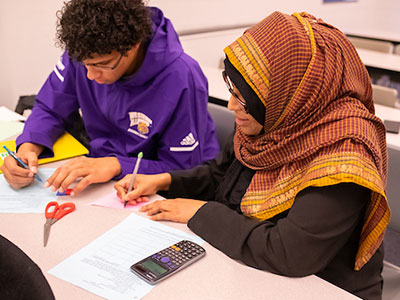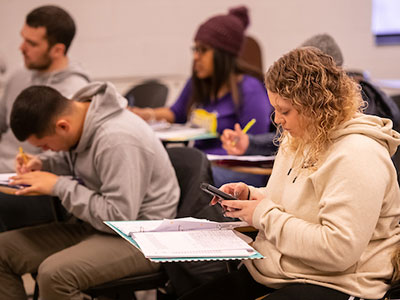Department of Mathematics and Philosophy

Graduate Programs in Mathematics
- Overview
- Mathematics
- Teaching Mathematics
- Advising
- MATH 596 Project
- MATH 602 Internship
- Forms & Resources
Please note: All questions about the graduate program should be addressed to the Graduate Coordinator, Dr. Dinesh Ekanayake. Phone: (309) 298-1529, Email: DB-Ekanayake@wiu.edu
Overview
The Department of Mathematics and Philosophy offers two master of science programs:
- Master of Science in Mathematics (30 s.h.)
- Master of Science in Teaching Mathematics-fully online (33 s.h.)
The programs provide an alternative to traditional programs by preparing students who would pursue a career in business, industry, or government, as well as to train mathematicians who would pursue further study towards a doctoral degree. The program offers a flexible course structure, built on core courses and focus area courses from your choice of a wide range of specializations.
View the specific degree requirements and course descriptions in the Graduate Catalog.
Careers
The occupational fields open to students who have completed an MS program with a proper selection of a focus area include: mathematical analysis in industry or government, teaching, computer-related employment, data analysis and other statistical work, and mathematical aspects of business and finance. Requirements are sufficiently flexible to allow for individual interests and specialization based upon career goals.
Assistantships
Various assistantship positions are available, including teaching support assistantships (tutoring in math help centers) and teaching assistantships (teach undergraduate classes). Visit the School of Graduate Studies for information regarding Graduate Assistantships.
Integrated Bachelor/Master of Science
The integrated baccalaureate and master’s degree program provides an opportunity for academically strong undergraduate Mathematics majors to complete both the bachelor’s and master’s degrees in five years. The program is designed to provide an accelerated alternative to traditional programs by preparing students who would pursue a career in business, industry, or government, as well as to train mathematicians who would pursue further study toward a doctoral degree in mathematics. View the Graduate Catalog for program details.
M.S. in Mathematics

The M.S. in Mathematics provides an alternative to traditional programs by preparing students who would pursue a career in business, industry, government, or pursue further study towards a doctoral degree. The program offers a sufficiently flexible course structure, built on core courses and a wide range of specialized focus area courses.
The MS program provides students with solid graduate-level training in analysis, computational mathematics, and statistics. Both the theoretical framework and applications are covered in six core courses.
The program also allows students to choose a focus area in a single field within mathematics, or in a discipline related to mathematics. Diverse options are available for the choice of a focus area, and include statistics, applied mathematics, numerical analysis, pure mathematics, data science, computer science, economics, physics, or the teaching of mathematics.
Admission & Degree Requirements
View the admission requirements, degree requirements, and course descriptions in the Graduate Catalog.
M.S. in Teaching Mathematics

The M.S. in Teaching Mathematics is a fully online degree designed for current teachers of secondary mathematics. This innovative program gives teachers an opportunity to earn a Masters degree in Mathematics and provides opportunities for these teachers to teach dual credit and college-level courses.
The MSTM program provides students with four core courses in mathematics, computational math, statistics, and secondary mathematics content knowledge. Students then choose five elective courses in mathematics, statistics, or mathematics education, along with two courses that form an action research capstone to their degree.
Admission & Degree Requirements
View the admission requirements, degree requirements, and course descriptions in the Graduate Catalog.
Advising

Dr. Dinesh Ekanayake, Mathematics Graduate Program Coordinator
Office: Morgan Hall 463B
Phone:
(309) 298-1239
Email:
DB-Ekanayake@wiu.edu
MATH 596 Project in Applied Mathematics
596 Project in Applied Mathematics. (3, repeatable to 6) A project in applied mathematics or statistics, or with a professional institution, which will be presented in a final paper or portfolio, demonstrating entry into an applied mathematics field. Graded S/U. Prerequisite: Permission of the Graduate Committee.
Protocol
Any faculty member responsible for guiding the project serves as the Project Supervisor. The student must submit the project outline to the Coordinator of the Graduate Program and receive approval.
Application Requirements
- Minimum G.P.A. required: 3.0
- Students may count up to 6 s.h. towards the focus area courses.
- Project application form must be submitted before the end of the semester prior to the proposed project.
Registration Requirements
Complete the project application and submit it with the project supervisor’s signature. Signing the application form confirms that the project supervisor will take the necessary steps to complete the project. The department chair signs the application, approves the project, and gives permission for registration.
Student Responsibility
It is the responsibility of the student to complete a project report, which must be approved by the supervisor, and a summary of the project. These must be provided to the Graduate Coordinator. Failure on the part of the student to submit the report or the project summary may result in a grade of "Unsatisfactory", which is equivalent to no credit earned for the project. Students who do not complete the requirements by the end of a term will receive an incomplete (“I”). All requirements must be completed by the sixth week of the term following the project to remove an “I”.
Project Supervisor Responsibility
Submit a letter of evaluation of the student’s performance and approval of the report.
Graduate Coordinator Responsibility
Evaluate documentation submitted by the student and the project supervisor. Assign a “S/U” grade at the completion of evaluation.
MATH 602 Internship in Applied Mathematics
602 Internship in Applied Mathematics. (3, repeatable to 6) Mathematical work or training conducted at a professional institution, university or government organization, which will be presented in a final paper or portfolio, demonstrating advanced proficiency in an applied mathematics field. Graded S/U. Prerequisite: Permission of the Graduate Committee.
Designated Personal
- The chair of the graduate committee coordinates all the internship activities and serves as the Internship Coordinator of the department. All internships must first be approved by the coordinator.
- Any faculty member responsible for monitoring an internship while it is in progress serves as the Internship Supervisor.
Protocol
- The student must prepare a proposal, submit it to the internship coordinator, and be granted approval.
Application Requirements
- Minimum overall G.P.A. required: 3.0
- Minimum major G.P.A. required: 3.0
- Students may count toward the major up to 3 s.h. each of the MATH 602 internship, for a maximum of 6 s.h.
The number of credit hours will be determined by the department graduate committee after examining the description and the hours of the activities undertaken for the internship. - The internship site must have an existing Internship Program within its organization.
- The application must be submitted in advance of the date of the proposed internship. SPECIFICALLY, THIS MUST BE DONE PRIOR TO FINAL EXAM PERIOD OF THE SEMESTER PRIOR TO INTERNSHIP.
Registration Requirements
- Submit the completed proposal.
- Submit documentation of the company’s Internship Program.
- Submit the documentation from the company regarding the specific internship site and work assigned.
- Provide the on-site supervisor contact information and offering letter (if available) from the internship program.
Student Internship Responsibility
It is the responsibility of the interning student to complete all the requirements listed below and submit materials to the Department Internship Supervisor.
- Weekly Log - Include duties performed, experiences and personal insights for each day.
- Final Internship Report - The student will submit to the Faculty Internship Supervisor a report on the activities undertaken during the internship. This report is to be detailed and relate the activities to the student's degree program. The frequency with which the student should report on internship activities during the internship is at the discretion of the Faculty Internship Supervisor.
- Letter of Evaluation - Request a letter of evaluation regarding the student’s internship performance from the on-site supervisor, to be sent directly to the Department Internship Coordinator or the student’s Internship Supervisor.
- Provide the on-site supervisor contact information and offering letter (if available) from the internship program.
The weekly log, final internship report, and letter of evaluation must be submitted to the Department Internship Coordinator and to the student’s Internship Supervisor before credit can be awarded.
On-Site Supervisor Responsibility
Write a letter of evaluation of the intern’s performance during the internship. Mail it directly to the Department Internship Coordinator or to the student’s Internship Supervisor at the completion of the internship.
Faculty Internship Supervisor Responsibility
Serve as the faculty contact for the internship provider. Evaluate the weekly log and grade the final Report of Internship Activities.
Department Internship Coordinator Responsibility
- Evaluate the internship documentation and offering letter submitted by the student and approve the internship registration.
- Submit the documentation from the company regarding the specific internship site and work assigned.
- Assign a grade at the completion of the internship, with the support of the faculty internship supervisor.
Independent Study and Special Topics
- Math 590 – Independent study (pdf)
- Math 599 – Special topics (pdf)
- Math 699 – Special topics (pdf)
- Tutorial study (pdf)
Internships and Projects
Thesis Resources
School of Graduate Studies
School of Graduate Studies Forms
(Starting Out, Continuing Studies, and Finishing Up)

Connect with WIU: